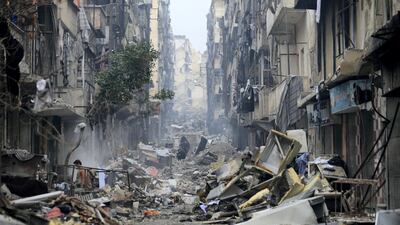Sergey Lavrov, Russia's foreign minister, struck all the right notes about finding a political settlement in Syria during his press conference in Abu Dhabi with Sheikh Abdullah bin Zayed. Both men agreed that more time was needed to see progress on peace talks, but that for this to happen, there would need to be an end to the terrorism inflicted on the people of Syria.
UN Security Council resolution 2254 from 2015 was invoked as a road map to peace. It remains the guiding document for a potential peace process. However, facts on the ground have changed since then and Bashar Al Assad is playing by his own, warped rules. At this point, it might be worth heeding the warning from Robert Ford that Mr Assad has already won.
___________________
Read more
Syria schools replace playgrounds with vegetable gardens to feed hungry children
Syria economy unlikely to return to growth until 2020, BMI Research says
Syria opposition talks in Riyadh end in stalemate
___________________
This pronouncement might seem bizarre given that Syria remains wracked by conflict, with control of its lands splintered and ISIL still at large, half of its population displaced and historic monuments in Palmyra, Aleppo and Homs lost forever.
However, the former US ambassador to Syria's larger point, as told to The National's Joyce Karam in an interview in Washington on Monday, holds true; that there are certain realities on the ground that have become permanent. Chiefly, Mr Ford is referring to Iran's entrenchment and the unlikelihood of Mr Assad ever being held accountable for his crimes against his own people and the loss of hundreds of thousands of lives in a conflict that he escalated.
___________________
LISTEN Why do white supremacists support Bashar Al Assad?
___________________
The forces supporting Mr Assad – his own army, in addition to Hizbollah and Iranian-led militias – could regain control of the remaining parts of the country, as the regime continues to ignore Russian de-escalation zones. Rebel opposition groups in Homs and Jobar are already being bombed and sooner or later, Deraa or Idlib will be retaken, says Mr Ford.
Also likely is that Mr Assad’s regime will never accept any kind of power share or decentralisation of control. The state of affairs in Syria has potentially grave implications for the wider region, from Israel’s growing nervousness about Iran’s influence in an already antagonistic neighbouring country, to Kurdish ambitions for independence. All the while, the children of Syria have little hope of any kind of victory. In Raqqa, they are likely to bear the mental scars of life under ISIL for decades even once the brutal extremist group is driven out by US-backed forces.
___________________
Read more from Opinion on Syria
The cult of Bashar Al Assad extends from the far-right to the far-left
The question of reconstruction could determine Assad’s political destiny
What ISIL's rise in 2014 tells us about Al Qaeda's potential in Syria today
___________________
According to Save the Children, families in Raqqa are facing an impossible decision to stay amid the threat of being bombed or leave and risk deadly ISIL reprisals. Time may well have run out and even as the conflict begins to wind down, there is little hope of any kind of real change in the country. This is the urgent challenge facing all parties with an interest in resolving the crisis in Syria.
Ambassador Ford’s statement that Mr Assad “has won” implies mere survival, while handing over sovereign-decision making about the use of arms and the killing of over half a million of his own citizens to Iran. The international community has a closing window of opportunity to remind Mr Assad that successful leadership means protecting your country and people and taking them forward, not holding them hostage to the barrel of a gun.
Follow The National's Opinion section on Twitter

